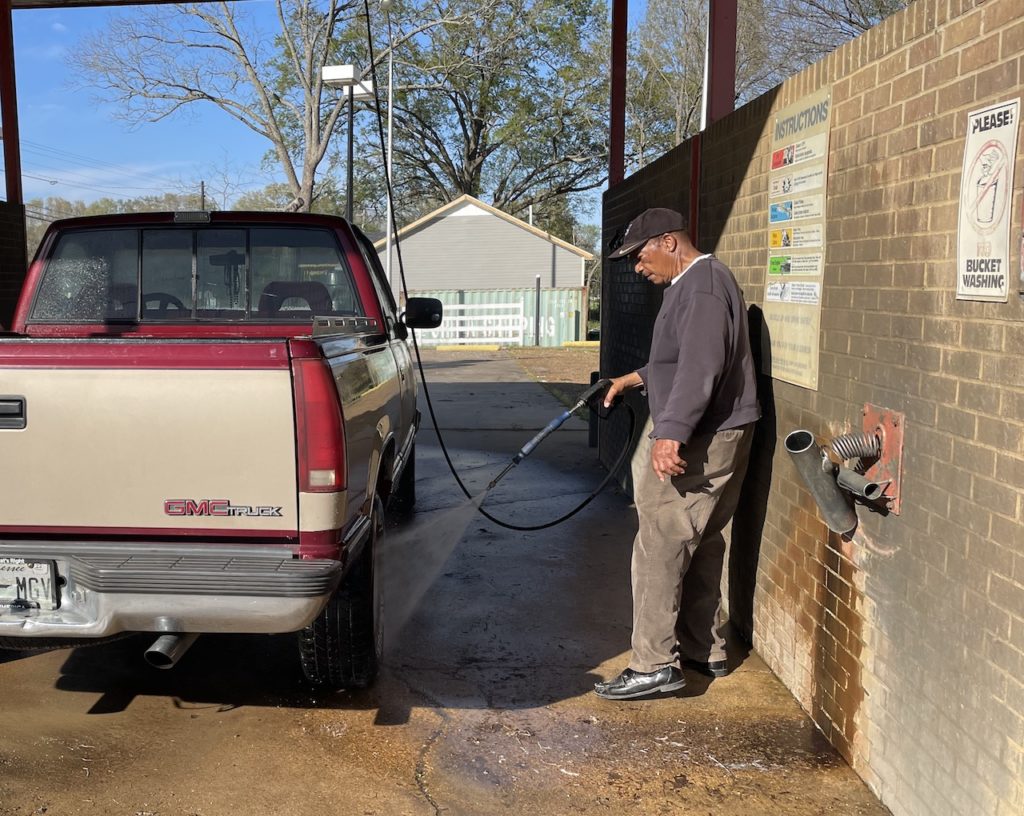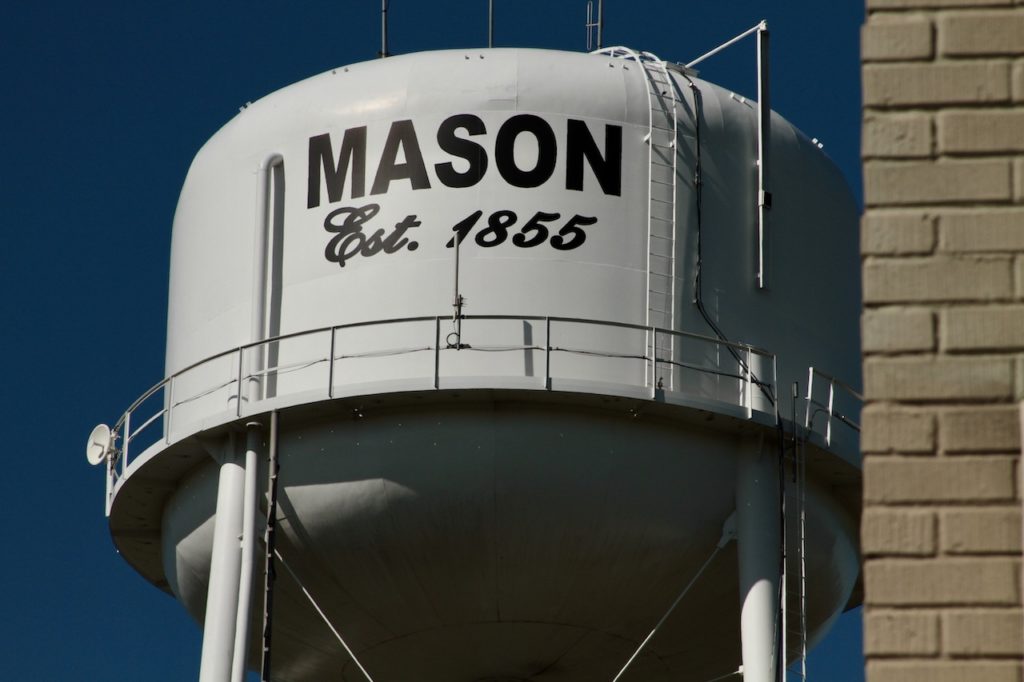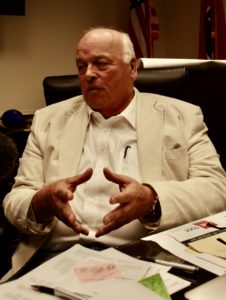
The town of Mason sits at the edge of what will be called Blue Oval City in rural West Tennessee. It’s less than two square miles. No stoplight. But it does have a sewer system — and a little carwash.
On a sunny afternoon, Tommy Tate drops a few quarters in to rinse the pollen off his old GMC truck. He’s not a Ford man, no matter that the automaker is building a $5.6 billion plant within earshot.
“Too late. I’ve got a new GMC at home,” he says.
But Tate is eager to see all the jobs Ford will create. It’s not just the 6,000 positions in the plant building electric trucks. Mammoth manufacturers like Ford spawn thousands of jobs with suppliers. Some will even build on the sprawling 4,100 megasite itself, or just beside it.
There’s been nowhere for young people to get good paying jobs once they graduate high school, Tate says.
“Mostly, they have to leave town in order to find a decent job making decent wages,” the retiree says.
 Blake Farmer WPLN News
Blake Farmer WPLN NewsThe town of Mason has its own utility system including water and sewer. Utilities have been the most difficult hurdle to overcome in developing the West Tennessee megasite.
And Mason has one of the only sewage systems around, though it couldn’t come close to handling the megasite’s wastewater.
It took years for the state to work out its wastewater problems at the West Tennessee megasite. The rolling farmland is perfect for a big auto plant, like the one Ford is building now. But there was nowhere for the sewage to go. That costly problem has been solved. But neighboring communities are now left with their own scramble for sewage. And the battle to control the building boom was what threatened the very existence of the majority-Black town of Mason.
In order to attract Ford, the state ponied up for a treatment plant and discharge pipeline that spans all of Tipton County to reach the Mississippi River.
Bob Rolfe, the commissioner of the Tennessee Department of Economic and Community Development, tells WPLN News that the system is exclusively for the state-owned megasite — not the neighborhoods, commercial developments or affiliated industry that might locate nearby.
“There was no consideration to have the locals tap into that pipeline because that would have taken up capacity that we need to reserve not only for the tenants today that we are estimating but for other tenants we’re recruiting,” he says.
 Blake Farmer WPLN News
Blake Farmer WPLN NewsThe West Tennessee Megasite, which will become Blue Oval City, will have its own sewage treatment and wastewater pipeline that will cross all of Tipton County to reach the Mississippi River.
Local officials in several counties are left in a mad dash to solve the same sewage problem the state faced.
Tipton County Mayor Jeff Huffman, who has was first elected county executive in 1986 and has served nine consecutive terms, says he’s working on wastewater every day.
“There’s never been this size and scale of a private investment in this kind of a remote, rural area,” he says.
Beyond being so rural, one of the challenges is West Tennessee’s topography. It’s pretty flat.
The nation’s most powerful river may run along the west side of the county, but elsewhere, water doesn’t flow very fast through the swampy streams that separate one cotton field from another. That means the streams and rivers can’t dilute much treated sewage, so environmental regulators are more stingy about wastewater permits.
 Blake Farmer WPLN News
Blake Farmer WPLN NewsJeff Huffman has served nine terms as mayor of Tipton County. He was first elected in 1986. He was appointed to the megasite authority by Gov. Bill Lee late last year.
Huffman’s trying to build a tri-county system to support the development that’s coming, and there should be some state grant money to help.
Until then, all he has to work with are some small-town sewers.
“But that’s the key piece of how this growth is going to occur in what I call this blast zone around Blue Oval City,” he says.
County commission meeting minutes show Tipton County — itself — has purchased several hundred acres within that blast zone to cash in on the building boom. They’re directly between Mason and the western edge of the megasite. But there are no utilities, so the county is at the mercy of the town currently.
“These African American leaders have now pretty much won the lottery,” says Van Turner, the NAACP lawyer who represented the town of 1,300 as it fought off a state takeover.
The attempt centered on Mason’s utility district. The Tennessee Comptroller raised concerns that the town had used utility revenue to prop up the town’s budget and hadn’t paid back the money. Turner noted in court that the questionable fund diversion occurred under white leadership that was in charge at the time and questioned why it was suddenly such a big problem. The state took the unprecedented step of asking residents to dissolve their own charter.
More: In Mason, a historical pattern of white leaders assuming control of Black towns reemerges
Dissolving the town would have meant Tipton County could take control of the sewer system, which it desperately needs.
“In order to build in Mason and around Mason, you have to ask the town’s permission to tap into its water/sewer system,” Turner says. “That’s for them to grant or deny as long as they’re the leaders in place.”
The county mayor acknowledged the sewer system has some excess capacity but told WPLN News his preference was not to take over. Still, Mason has been out of the loop all along, despite its proximity to the site. Leaders weren’t even invited to Ford’s big announcement last fall.
Mason reached an acceptable agreement last week to clean up the accounting issues from years back. While it was Mason’s sewer system that got the town in trouble with state auditors, Turner says it will be what keeps Mason from being overlooked again.
“The leadership that’s in place probably wants to create opportunities for African Americans and African American businesses and women-owned businesses who would be shut out of those opportunities historically,” he says. “So there’s a lot of power to be wielded now.”

